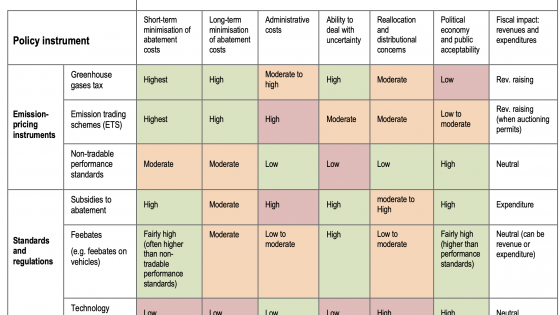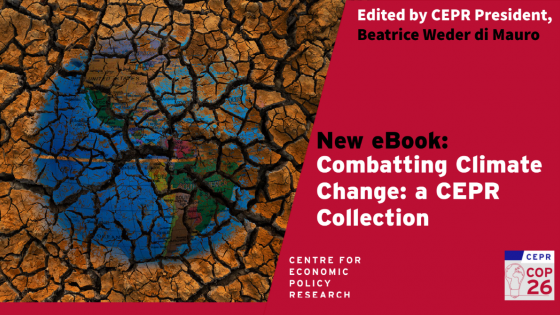Public finance theory suggests that environmental policies should be carried out at the national level of government because of the public good nature of environmental protection and the presence of economies of scale in the provision of environmental services. Decentralisation could lead to a regulatory ‘race to the bottom’ among competing jurisdictions to attract residents and investment, which would result in sub-optimal environmental outcomes (Gray and Shadbegian 2004). Decentralisation could also lead to faster natural resource depletion due to common-pool problems. Moreover, emissions and air pollution outcomes would be worse under decentralised standard-setting due to failure to account for interjurisdictional spillovers (Banzhaf and Chupp 2010). The same argument applies to water pollution and a host of outcomes related to adaptation and mitigation of the effects of climate change.
Environmental outcomes could nevertheless improve under policy decentralisation. To the extent that harmful activities can be exported to jurisdictions with more lenient regulations, outcomes would improve in the exporting jurisdiction. Nationwide net effects are uncertain, and disparities in outcomes could actually increase within countries (Cutter and DeShazo 2007, Sigman 2014, Xia et al. 2021). This may not necessary arise from harmful horizontal competition, to the extent that minimum standards can be set nationwide, but instead from a better recognition of spatial differences in preferences. More importantly, decentralisation could result in better overall outcomes to the extent that it improves monitoring and supervision by empowering the subnational governments in regulatory matters and exploiting their ‘informational’ proximity to households and firms (Levinson 2003).
The regional and local governments do indeed play an important role in environmental policies. For example, energy efficiency standards for buildings and land use regulations are issued in most countries by the subnational governments, not the central administration (de Mello 2021). Subnational governments are also at the forefront of managing natural disasters, whose risk distribution is influenced by climate change. Moreover, in the area of adaptation to climate change, the subnational jurisdictions have a role to play because they account for the lion’s share of public investment. At the same time, in many countries the regional governments are spearheading mitigation initiatives related to the introduction of carbon pricing, sometimes ahead of the national administrations. The experience of California in the US and British Columbia in Canada are cases in point.
A better understanding of the intergovernmental aspects of climate change mitigation and adaptation contributes to overall efforts to adapt the public finances to the challenge of climate change (Pisu et al. 2022, Thygesen et al. 2022). Scaling up public investment, absorbing the costs of more severe weather-related shocks, and deploying fiscal instruments, such as subsidies for innovation, support for vulnerable groups and carbon taxes, all call for effective intergovernmental coordination. There is much need for further scholarly work in these areas (de Mello and Martinez-Vazquez 2022).
The empirical evidence
For all these reasons, decentralisation may influence people’s attitudes towards the environment and the design of environmental policies. There is a fairly large body of empirical evidence based on individual-level survey-based data that attitudes to the environment vary according to personal and household characteristics, as well as socioeconomic context and political settings.
Yet, the empirical literature is mute on how policy decentralisation, including in particular the assignment of policy responsibilities across the level of administration, affects attitudes to the environment. We bridged this gap in a new paper (de Mello and Jalles 2022) by using individual-level data from the World Values Survey1 and show that decentralisation does indeed contribute to more favourable attitudes to the environment, controlling for personal and household characteristics of respondents, as well as country and cohort effects.
The main insight from our analysis is that people who have been exposed to comprehensive decentralisation tend to have more favourable attitudes to the environment than those who have not had a similar experience. Rather than asking survey respondents abstract questions about their preferences and attitudes to decentralised governance – a concept that is difficult to grasp even by well-informed individuals – we focus instead on concrete experience with comprehensive decentralisation through exposure during an individual’s adult life to episodes of widespread changes in the policymaking, administrative, and political prerogatives of the subnational layers of administration. For that we constructed a chronology of comprehensive decentralisation episodes across countries using the Regional Authority Index computed by Hooghe et al. (2016).
The empirical literature is also sparse on cross-country evidence on the association between decentralisation and environment-related tax and spending policies. To contribute to this line of research we used aggregate country-level national accounts data for a large set of advanced economies and developing countries. Rather than looking at country-specific programmes and experiences, as in most of the empirical literature,2 we looked at the environmental taxes collected by government and actual government spending on environment-related programmes.
We find that the decentralisation of both revenue and spending functions to the subnational levels of government is associated with higher spending on environment-related programmes in relation to GDP, controlling for conventional public finance covariates. We also find a positive association between decentralisation and collection of environment-related tax revenue, even though parameters are estimated less precisely than in the case of government spending on the environment, except for the advanced economies.
To be sure about the direction of causality we explored the dynamic short-to-medium term effect of decentralisation on environment-related spending. We used the chronology of comprehensive decentralisation episodes to compute impulse responses to decentralisation shocks. The analysis shows that increases in government spending on the environment are persistent over time following episodes of comprehensive decentralisation (Figure 1).
Figure 1 Decentralisation and environmental fiscal outcomes: Dynamic effects
Note: The graph shows the estimated impulse response of spending on the environment to a decentralisation shock with 90 (68) percent confidence bands computed using robust standard errors clustered at the country level. The x-axis shows years (k=1,…,6) after the decentralisation shocks; year = 0 is the year of decentralisation. For more information, see de Mello and Jalles (2022).
What do we learn from this analysis?
It is encouraging that evidence from both individual-level survey-based and aggregate national accounts data points to a statistical association between decentralisation, attitudes to the environment, and environmental policy. This main finding suggests that more decentralised countries may be better equipped to deal with a host of policy challenges, including those related to climate change mitigation and adaptation. Of course, decentralisation is not, in and of itself, a policy lever that can be deployed primarily in pursuit of environmental objectives, but it is part of the institutional setting in which environment-related policy is designed and implement, which influences attitudes, preferences and outcomes.
References
Banzhaf, S and A Chupp (2010), “Environmental quality in a federation: Which level of government should regulate air pollution?”, VoxEU, 1 July.
Contorno, L (2012), “The Influence of Cosmopolitan Values on Environmental Attitudes: An International Comparison”, Res Publica 17: 12-39.
Cutter, W B and J R DeShazo (2007), “The environmental consequences of decentralizing the decision to decentralize”, Journal of Environmental Economics and Management 53: 32-53.
de Mello, L (2021), “The Great Recession and the Great Lockdown: How are they shaping intergovernmental relations?”, in I Lago (ed.), Handbook on Decentralisation, Devolution and the State, Edward Elgar, pp. 347-74.
de Mello, L and J T Jalles (2022), “Decentralisation and the environment: Survey-based and cross-country evidence”, REM Working Papers, No. 0215-2022, School of Economics and Management, University of Lisbon.
de Mello, L and J Martinez-Vazquez (2022), “Climate change implications for the public finances and fiscal policy: An agenda for future research and filling the gaps in scholarly work”, Economics, forthcoming.
Elheddad, M, N Djellouli, A K Tiwari and S Hammoudeh (2020), “The relationship between energy consumption and fiscal decentralization and the importance of urbanization: Evidence from Chinese provinces”, Journal of Environmental Management 264: 1104-74.
Gelissen, J (2007), “Explaining Popular Support for Environmental Protection: A Multilevel Analysis of 50 Nations”, Environment and Behavior 39: 392-415.
Gray, W B and R J Shadbegian (2004), “’Optimal pollution abatement – Whose benefits matter, and how much?”, Journal of Environmental Economics and Management 47: 510-34.
Hooghe, L, G Marks, A H Schakel, S Chapman, S Niedzwiecki and S, Shair-Rosenfield (2016), Measuring Regional Authority: A Postfunctionalist Theory of Governance, Vol. I, Oxford University Press.
Ji, X, M Umar, S Ali, W Ali, K Tang and Z Khan (2020), “Does fiscal decentralization and eco-innovation promote sustainable environment? A case study of selected fiscally decentralized countries”, Sustainable Development X: 1-10.
Konisky, D M (2007), “Regulatory Competition and Environmental Enforcement: Is There a Race to the Bottom?”, American Journal of Political Science 51: 853-72.
Levinson, A (2003), “Environmental regulatory competition: A status report and some new evidence”, National Tax Journal 56: 91-106.
Li, Q, B Wang, H Deng and C Yu (2018), “A quantitative analysis of global environmental protection values based on the world values survey data from 1994-2014”, Environmental Monitoring and Assessment 190: 593.
Pisu, M, F M D’Arcangelo, I Levin and A Johansson (2022), “A framework to decarbonise the economy”, VoxEU, 14 February.
Sigman, H (2014), “Decentralization and Environmental Quality: An Inter-national Analysis of Water Pollution Levels and Variation”, Land Economics 90: 114-30.
Thygesen, N, R Beetsma, M Bordignon, X Debrun, M Szczurek, M Larch, M Busse, M Gabrijelcic, L Jankovics and J Malzubris (2022), “Public finances and climate change in the post-pandemic era”, VoxEU, 16 March.
Torgler, B and M A García-Valiñas (2007), “The determinants of individuals' attitudes towards preventing environmental damage”, Ecological Economics 63: 536-52.
Xia, S, D You, Z Tang and B Yang (2021), “Analysis of the Spatial Effect of Fiscal Decentralization and Environmental Decentralisation on Carbon Emissions under the Pressure of Officials' Promotion”, Energies 14: 1878.
Wright, G D, K P Andersson, C C Gibson and TP Evans (2016), “Decentralization can help reduce deforestation when user groups engage with local government”, PNAS 113.
Endnotes
1 The World Values Survey has also been widely used to gauge the drivers of attitudes to the environment (Gelissen 2007, Torgler and García-Valiñas 2007, Contorno 2012, Li et al. 2018).
2 Most of the empirical literature on decentralisation and the environment focuses on case studies of specific resource management and environmental protection programmes and on the linkages between decentralisation and outcomes in these areas; see, for example, evidence in the areas of forest management (Wright et al. 2016), energy consumption (Elheddad et al. 2020), and emissions standards (Konisky 2007, Ji et al. 2020), to cite just a few.




